大学英语语法-虚拟语气讲课稿
- 格式:doc
- 大小:45.50 KB
- 文档页数:9


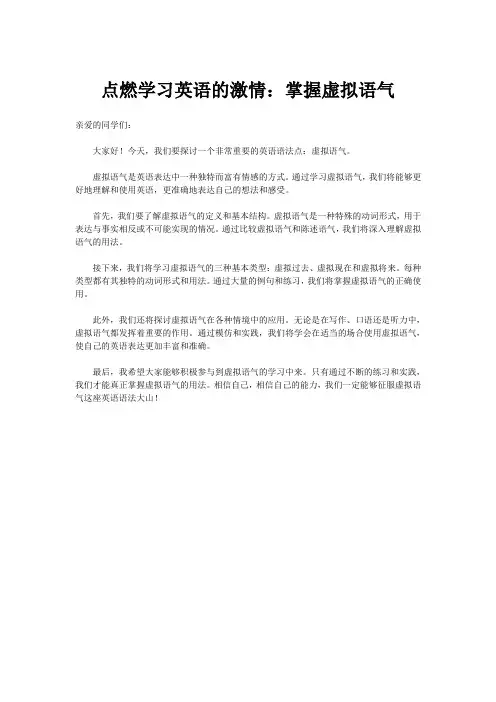
点燃学习英语的激情:掌握虚拟语气
亲爱的同学们:
大家好!今天,我们要探讨一个非常重要的英语语法点:虚拟语气。
虚拟语气是英语表达中一种独特而富有情感的方式。
通过学习虚拟语气,我们将能够更好地理解和使用英语,更准确地表达自己的想法和感受。
首先,我们要了解虚拟语气的定义和基本结构。
虚拟语气是一种特殊的动词形式,用于表达与事实相反或不可能实现的情况。
通过比较虚拟语气和陈述语气,我们将深入理解虚拟语气的用法。
接下来,我们将学习虚拟语气的三种基本类型:虚拟过去、虚拟现在和虚拟将来。
每种类型都有其独特的动词形式和用法。
通过大量的例句和练习,我们将掌握虚拟语气的正确使用。
此外,我们还将探讨虚拟语气在各种情境中的应用。
无论是在写作、口语还是听力中,虚拟语气都发挥着重要的作用。
通过模仿和实践,我们将学会在适当的场合使用虚拟语气,使自己的英语表达更加丰富和准确。
最后,我希望大家能够积极参与到虚拟语气的学习中来。
只有通过不断的练习和实践,我们才能真正掌握虚拟语气的用法。
相信自己,相信自己的能力,我们一定能够征服虚拟语气这座英语语法大山!。
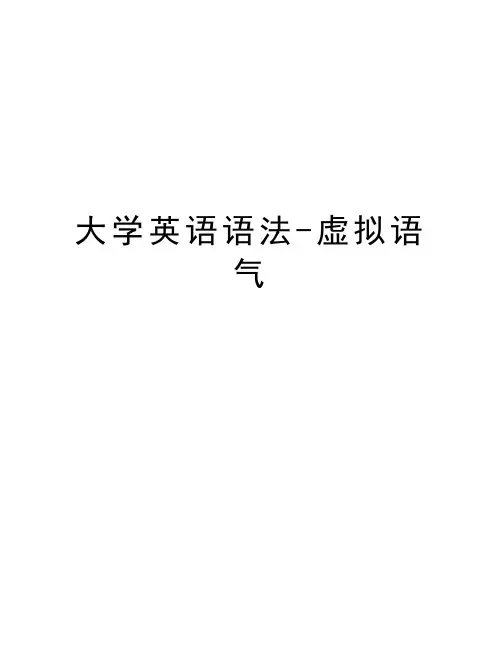
大学英语语法-虚拟语气虚拟语气1. I wish (that可省略,下同)I knew the answer to the question.我希望知道这个答案。
(事实上是不知道)2. He wishes he hadn't lost the chance.他真希望没有失去机会。
(其实已失去)3. You wished she would arrive the next day.(would + arrive)你希望她第二天会到。
(事实上她还没到)Subjunctive Mood作为专门表达假设意义和其他非事实意义的动词形式,仅是古英语遗留下来的残余。
它仅有两个形式,即be型虚拟式和were型虚拟式。
Be型虚拟]-----be型虚拟式是以动词原形表示的,不管主语是什么人称,动词一律用原形,如动词为被动态,则助动词be也用原形。
其主要用法如下:1)用于表命令、决定、建议、坚持等词语之后的that分句中这一用法又分三种情况:a)用在decide,decree,demand,insist,move,order,prefer,propose,recommend,requ est,require,suggest,vote等动词之后的that分句中.(宾语从句)在expect, believe, think, suspect等动词的否定或疑问形式后的宾语从句中,我们经常用“should+动词原形(或完成形式)”,表示惊奇,怀疑,不满等。
He ordered that all the books be sent at once.He ordered that all the books be sent at once.we propose that somebody neutral take the chair.She insisted that she go to the south for her holiday.b)用在advisable,appropriate,desirable,essential,fitting,imperative,important,impos sible,necessary,obligatory,proper等形容词之后的that分句中。

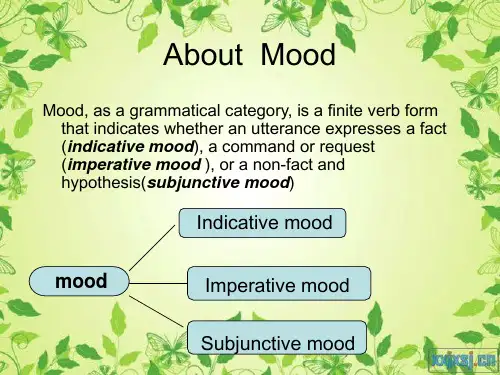
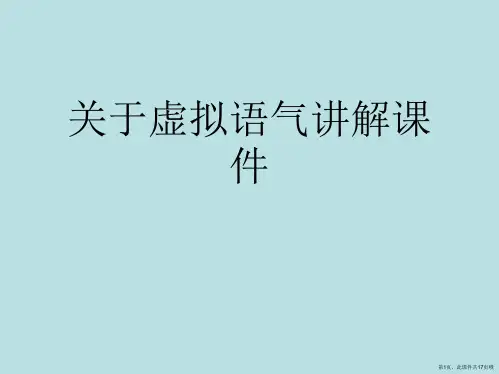

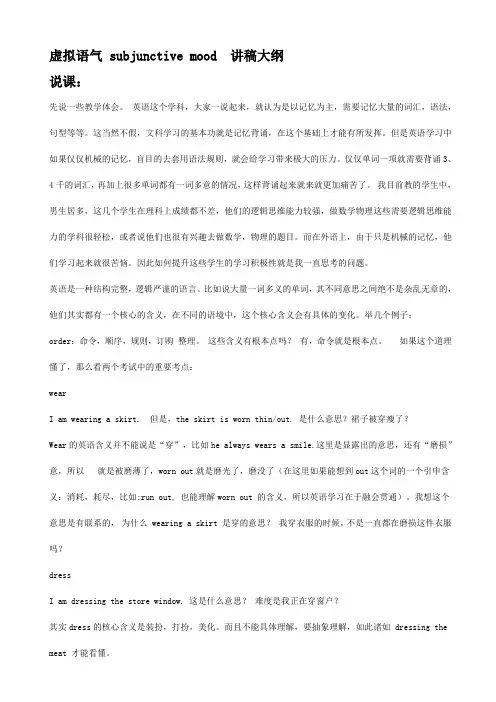
虚拟语气 subjunctive mood 讲稿大纲说课:先说一些教学体会。
英语这个学科,大家一说起来,就认为是以记忆为主,需要记忆大量的词汇,语法,句型等等。
这当然不假,文科学习的基本功就是记忆背诵,在这个基础上才能有所发挥。
但是英语学习中如果仅仅机械的记忆,盲目的去套用语法规则,就会给学习带来极大的压力。
仅仅单词一项就需要背诵3、4千的词汇,再加上很多单词都有一词多意的情况,这样背诵起来就来就更加痛苦了。
我目前教的学生中,男生居多,这几个学生在理科上成绩都不差,他们的逻辑思维能力较强,做数学物理这些需要逻辑思维能力的学科很轻松,或者说他们也很有兴趣去做数学,物理的题目。
而在外语上,由于只是机械的记忆,他们学习起来就很苦恼。
因此如何提升这些学生的学习积极性就是我一直思考的问题。
英语是一种结构完整,逻辑严谨的语言。
比如说大量一词多义的单词,其不同意思之间绝不是杂乱无章的,他们其实都有一个核心的含义,在不同的语境中,这个核心含义会有具体的变化。
举几个例子:order:命令,顺序,规则,订购整理。
这些含义有根本点吗?有,命令就是根本点。
如果这个道理懂了,那么看两个考试中的重要考点:wearI am wearing a skirt. 但是,the skirt is worn thin/out. 是什么意思?裙子被穿瘦了?Wear的英语含义并不能说是“穿”,比如he always wears a smile.这里是显露出的意思,还有“磨损”意,所以就是被磨薄了,worn out就是磨光了,磨没了(在这里如果能想到out这个词的一个引申含义:消耗,耗尽,比如:run out, 也能理解worn out 的含义,所以英语学习在于融会贯通)。
我想这个意思是有联系的,为什么 wearing a skirt 是穿的意思?我穿衣服的时候,不是一直都在磨损这件衣服吗?dressI am dressing the store window. 这是什么意思?难度是我正在穿窗户?其实dress的核心含义是装扮,打扮,美化。

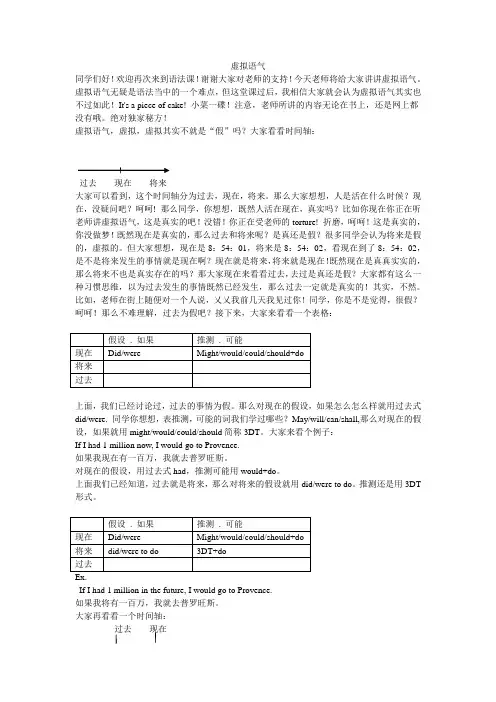
虚拟语气同学们好!欢迎再次来到语法课!谢谢大家对老师的支持!今天老师将给大家讲讲虚拟语气。
虚拟语气无疑是语法当中的一个难点,但这堂课过后,我相信大家就会认为虚拟语气其实也不过如此!It's a piece of cake! 小菜一碟!注意,老师所讲的内容无论在书上,还是网上都没有哦。
绝对独家秘方!虚拟语气,虚拟,虚拟其实不就是“假”吗?大家看看时间轴:过去现在将来大家可以看到,这个时间轴分为过去,现在,将来。
那么大家想想,人是活在什么时候?现在,没疑问吧?呵呵! 那么同学,你想想,既然人活在现在,真实吗?比如你现在你正在听老师讲虚拟语气,这是真实的吧!没错!你正在受老师的torture! 折磨,呵呵!这是真实的,你没做梦!既然现在是真实的,那么过去和将来呢?是真还是假?很多同学会认为将来是假的,虚拟的。
但大家想想,现在是8:54:01,将来是8:54:02,看现在到了8:54:02,是不是将来发生的事情就是现在啊?现在就是将来,将来就是现在!既然现在是真真实实的,那么将来不也是真实存在的吗?那大家现在来看看过去,去过是真还是假?大家都有这么一种习惯思维,以为过去发生的事情既然已经发生,那么过去一定就是真实的!其实,不然。
比如,老师在街上随便对一个人说,乂乂我前几天我见过你!同学,你是不是觉得,很假?呵呵!那么不难理解,过去为假吧?接下来,大家来看看一个表格:假设. 如果推测. 可能现在Did/were Might/would/could/should+do将来过去上面,我们已经讨论过,过去的事情为假。
那么对现在的假设,如果怎么怎么样就用过去式did/were. 同学你想想,表推测,可能的词我们学过哪些?May/will/can/shall,那么对现在的假设,如果就用might/would/could/should简称3DT。
大家来看个例子:If I had 1 million now, I would go to Provence.如果我现在有一百万,我就去普罗旺斯。
最经典最清晰虚拟语气讲解虚拟语气定义:虚拟语气用来表示说话人的主观愿望或假想,不是事实或与事实相反。
陈述语气祈使语气动词的语气非真实条件句中的虚拟语气名词性从句中的虚拟语气虚拟语气特殊句型中的虚拟语气虚拟语气需特别注意的情况用法:一.IF引导的虚拟句式注意;混合虚拟(1)不同时间的虚拟:If he had listened to me, he would not be in trouble now.If he had told me yesterday, I should know what to do now.(2) 虚拟与陈述的混合:He could have passed the exam, but he wasn’t careful enough. You should have come earlier, the bus left a moment ago.二.名词性从句中的虚拟语气:从句谓语动词(should) +do1.主语从句:it is + adj + that结构2.宾语从句:主语+要求接虚拟语气的动词+that一个坚持:insist两个命令:order; command 两个决定:decide; determine三个建议:suggest; advise; propose四个要求:demand; ask; request; require注意:① suggest:暗示;insist:坚持说(不虚拟)② except, believe, think suspect等动词的否定形式或疑问句后面的宾语从句要用虚拟。
I never thought that he should be such a brave young solider③ should竟然I am glad that your novel should have won the first prize.④ wish引导从句的虚拟语气,谓语动词变化和if从句虚拟语气一样。
虚拟语气1. I wish (that可省略,下同)I knew the answer to the question.我希望知道这个答案。
(事实上是不知道)2. He wishes he hadn't lost the chance.他真希望没有失去机会。
(其实已失去)3. You wished she would arrive the next day.(would + arrive)你希望她第二天会到。
(事实上她还没到)Subjunctive Mood作为专门表达假设意义和其他非事实意义的动词形式,仅是古英语遗留下来的残余。
它仅有两个形式,即be型虚拟式和were型虚拟式。
Be型虚拟]-----be型虚拟式是以动词原形表示的,不管主语是什么人称,动词一律用原形,如动词为被动态,则助动词be也用原形。
其主要用法如下:1)用于表命令、决定、建议、坚持等词语之后的that分句中这一用法又分三种情况:a)用在decide,decree,demand,insist,move,order,prefer,propose,recommend,request,require, suggest,vote等动词之后的that分句中.(宾语从句)在expect, believe, think, suspect等动词的否定或疑问形式后的宾语从句中,我们经常用“should+动词原形(或完成形式)”,表示惊奇,怀疑,不满等。
He ordered that all the books be sent at once.He ordered that all the books be sent at once.we propose that somebody neutral take the chair.She insisted that she go to the south for her holiday.b)用在advisable,appropriate,desirable,essential,fitting,imperative,important,impossible,nece ssary,obligatory,proper等形容词之后的that分句中。
(主语从句)It is essential that all the facts be examined first.It was appropriate that thisi tax be abolished.I thousht it advisable that an armed guard stand in readiness.c)用在decision,decree,demand,instruction,order,requirement,resolution等名词之后的that分句中。
The board has given instructions that the agent fly to Boston.We were faced with the demand that this tax be abolished.Their decision was that the school remain closed.在这一用法中be型虚拟式能与“should+不定式”交替使用,也能与to-不定式交替使用。
He ordered that the books be sent at once .= He ordered that the books should be sent at onc.= He ordered that the books to be sent at once.2)用于由if,though等引导的分句中.be型虚拟式能用于由if,though,whatever,lest,so long as lest, for fear that, in caseso that, in order that 等引导的分句中表推测、让步、防备等含义。
If he be found guilty,Jonh shall have the right of appeal.Though everyone desert you, I will not.Quitly we sat on the river bank lest the fish swim away.上述用法现在只限于书面体,在非正式语体中通常用动词陈述式或者用should/may+不定式。
Whatever hisdefense maybe,we can’t tolerate this disloyalty.3)用于某些公式化语句中be型虚拟式用于某些公式化语句中可表祝愿、诅咒、禁止等意义。
Long live the People's Republic of China!God bless you!God damn you!So be it.(但愿如此吧)Were型虚拟]-----Were 型虚拟语气只有一种形式,即无论主语是什么人称,动词一律用were,如I were,you were ,如果动词为进行体或被动态,其助动词也一律用were,如I were going,you were going,I were sent ,you were sent1)用于某些状语从句如if , if only, as if , as though, though引导的条件状语和让步状语从句,表示非真是的条件或让步。
If I were you, I should wait till next week.If only I were not so nervous.He behaves as though he were better than us.2)用于某些名词性从句如wish, would rather, suppose,imagine 之后的that—分句中,表示一种臆想的(通常是不可能发生的事)I wish it were spring all the year round.I’d rather I were not at the site of the accident.Suppose the earth were flat.上述were型虚拟式在第一三人称单数主语之后可为was 所取代。
If it was to rain,the game would be put off.If only I was not so nervous.但是,在if I were you 这一分句中,通常不用was 。
另外在某些倒装句结构中只用were,不用was。
Were I to do it =(if I were to do it),I should rely on you.还有在as it were(作so to speak 解,即“宛如””好比”)结构中也只用were,不用was He is my best friend,my second felf ,as it were.假设意义表示法综述1)用动词的过去时形式表示假设意义a) It is (high ,about )time thatIt is time that we went (或should go) to bed.It’s about time that we put an end to this controversy.b) I would rather / would sooner / would as soon / would just as soon (that) you / he/ theyI’d sooner she left the heavy end of t he work to someone else.c) if onlyIf only I knew what you wanted.If only he had arrived in time,he would not have been punished.d) as if, as thoughIt seems as if it were spring.现在好像是春天似的。
She appeared as if she had known nothing about it.她看上去对此一无所知。
as if, as though结构中如果不表示假设意义,就不必用过去时时态。
It looks as if it is going to rain.e) I wish(that)I wish I remembered the address.I wish 与I hope都表示“希望”但I hope 并不表示假设意义其后很少用过去时时态。
I hope you are ready.用情态助动词过去时时态表示假设意义最常见于条件句和含蓄条件句a)用于条件句(若if 省略要用到装)If she were younger, she would do it.去If:Were she younger, she would do it. (把动词were移到主语she的前面)If he had tried it, he could have done it.去If:Had he tried it, he could have done it.(把had移到主语he的前面)Were I a bird, I could fly freely.如果虚拟条件句中有were, had或should时,把它们放在if的位置上;但是如果条件句中没有were, had或should不能用倒装。
如:Should it rain tomorrow, what should we do?要是明天下雨的话,我们怎么办呢?Were I you, I would have asked him for some advice.要是我是你的话,我就向他请教了。
在“开放式条件句”(open conditional clause)和让步状语从句中若should是被省略了的。
在这种情况下,如果if省略,动词be与主语的位置要倒装。
如:If any person be guilty of a crime, the court shall have the right to appeal. (任何人犯罪,法院有权起诉。
)Be any person guilty of a crime, the court shall have the right to appeal.Whether she be right or wrong, she will have my unanswering support. (不管她对与错,我都会支持她)Be she right or wrong, she will have my unanswering support.注意:有时虚拟条件句并没来if 从句表示出来,而是用介词短语(otherwise, or, without, but for)、上下文或其它方式来表示。